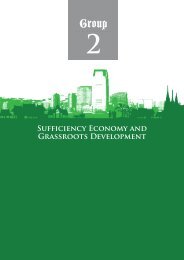Conflict, Legitimacy and Government Reform: Equitable Allocation of ...
Conflict, Legitimacy and Government Reform: Equitable Allocation of ...
Conflict, Legitimacy and Government Reform: Equitable Allocation of ...
Create successful ePaper yourself
Turn your PDF publications into a flip-book with our unique Google optimized e-Paper software.
58 KPI Congress XI<br />
Nevertheless, modern Thai governments still could not prevent<br />
deterioration <strong>of</strong> income inequality. Why?<br />
When comparing to other countries, public expenditure <strong>of</strong> Thail<strong>and</strong><br />
at the level <strong>of</strong> only 18 per cent <strong>of</strong> GDP is still very low. This level is<br />
below 26 per cent <strong>of</strong> developing countries in Asia <strong>and</strong> 36 per cent <strong>of</strong><br />
developed countries. The majority <strong>of</strong> public expenditure goes to wages<br />
<strong>and</strong> salaries <strong>of</strong> government employees which are on an upward trend,<br />
while in developed countries, public spending on subsidies <strong>and</strong> money<br />
transferred to welfare programs is as high as 50 per cent.<br />
Economists said public spending can make income distribution<br />
more equitable (Methee, 1979; TDRI, 1999; Peter Warr, 2003). It was<br />
observed that spending on education is the most efficient, followed by<br />
health care. Other studies also revealed that spending on the agricultural<br />
sector significantly increased income <strong>of</strong> lowest-income groups in the rural<br />
sector.<br />
However, historically such public spending was not enough to<br />
mitigate inequality stemming from other factors <strong>and</strong> the consequence <strong>of</strong><br />
tax burden borne by the poor that has reduced their income in relative<br />
terms.<br />
Such conclusion is substantiated by a research study entitled ‘Fiscal<br />
policies <strong>of</strong> Thail<strong>and</strong> <strong>and</strong> Impacts on Poor People’ which was conducted<br />
by Hyun Hwa Son, a South Korean economist. It was found that during<br />
1990s public spending <strong>of</strong> Thail<strong>and</strong> favored the rich <strong>and</strong> provided greater<br />
benefits to urban workers than rural people. State subsidies for electricity,<br />
water, transportation, hospitals <strong>and</strong> education under present schemes<br />
literally benefit well-to-do people more than the underprivileged.<br />
This study did not even take into consideration indirect benefits <strong>of</strong><br />
public spending which tend to fall into the h<strong>and</strong>s <strong>of</strong> the rich more than<br />
the poor. Obvious examples are road construction <strong>and</strong> electric train when<br />
l<strong>and</strong> prices along the routes went up. In such case, people who don’t own<br />
l<strong>and</strong> will not receive this benefit.














